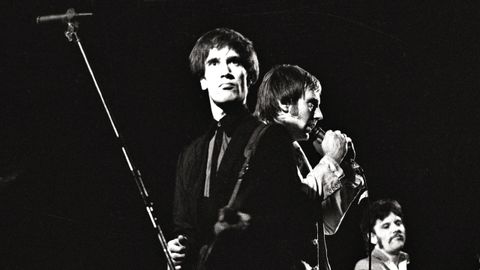Inevitably, Wilko Johnson’s recent health scare and astonishing recovery have drawn renewed attention to him and his work. He’s beyond national treasure, he’s a national miracle.
Much of his music has similarly enduring properties, not least that from his time with Dr. Feelgood in the mid-70s. If for many people the term ‘pub rock’ has a stale, provincial, retro air, Wilko in particular gives the lie to all of that. Jerky, robotic, uncontrollable, lurching in all directions, he’s like a skinny Frankenstein’s monster within the group. There is about his playing – clipped, angular, back to weird basics – a hint of what was just around the corner in the punk/post-years./o:p
Yes, Watch Your Step, from 1975’s Malpractice, sounds like a rip-off of The Beatles’ I Feel Fine. That is until you realise that it’s actually a version of R&B legend Bobby Parker’s original, and it was the Fab Four who were doing the borrowing.
Dr. Feelgood mainlined back to the blues, for sure, but they claimed the music as long-since British, the staple rhythm of their live circuit, investing their take on it with the time and the place they were in – the mists of 70s Essex. Despite their version of Muddy Waters’s Rolling And Tumbling, this isn’t homage, but the new realism of pre-punk, hacked-off Britain, alienated from its own music scene.
Dr. Feelgood were already pretty seasoned by the time they came to record the Down By The Jetty album in 1974, which is well represented here. Yet they sound rumbling and impatient for the decade to get on with it. On Roxette, Wilko’s guitar is almost Krautrock-ish in its sawn-off, insistent repetitiveness. Cheque Book is like rock’n’roll delivered a short, sharp back and sides, while Twenty Yards sounds almost ska-like.
There are occasional date-stamped moments – Don’t Let Your Daddy Know draws a wince from the 21st century, (‘You’re taking time off school…’) and doesn’t exactly enhance the wholesome reputation of the 1970s.
Still, with Wilko in particular zig-zag wandering across this collection, like a mid-point between Captain Beefheart and XTC on the live version here of All Through The City, this music bristles like a fresh resource rather than merely hanging like a period piece in the rock’n’roll hallway. It’s a living thing.
The collection is nicely rounded off with original versions of the Feelgood songs which appeared on the Wilko Johnson/Roger Daltrey collaboration Going Back Home, including Sneaking Suspicion and the album’s pub-storming title track./o:p


